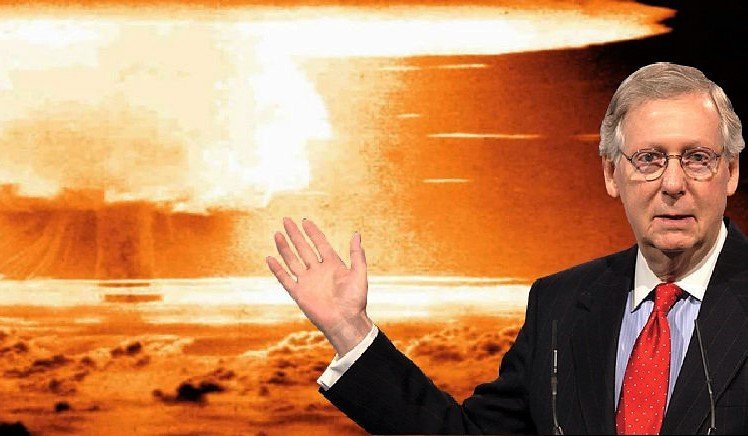Senate Republicans used the “nuclear option” today to unilaterally reduce debate time on most presidential nominees, the latest in a series of changes to the fabric of the Senate to dilute the power of the minority.
The move by Senate Majority Leader Mitch McConnell (R-KY) immediately paves the way for quicker confirmation of President Trump’s judicial and executive branch picks and comes amid deep GOP frustration with Democratic delays.
Future presidents will benefit too, though McConnell and Trump stand to gain inordinately as they seek to fill 130 District Court vacancies over the next 18 months before the 2020 election.
The nuclear option — a change of the Senate rules by a simple majority — gained its name because it was seen as an explosive maneuver that would leave political fallout for some time to come.
But it’s now been deployed three times in just six years amid continuous partisan warfare over nominations.
McConnell trashed Democrats’ “systematic obstruction” as he stumped for his effort on the Senate floor.
His move is particularly consequential in divided government when much of the Senate’s time is now spent confirming executive nominees and lifetime judicial appointments.
Under the change, debate time on District Court nominees and subcabinet executive nominees is slashed from 30 hours to 2 hours, a shift that will allow Republicans to fill dozens more vacancies over the coming months.
“It is time for this sorry chapter to end. It’s time to return this body to a more normal and reasonable process for fulfilling its constitutional responsibilities no matter which party control the White House,” McConnell said on Wednesday afternoon. Of Democrats’ slowing Trump nominees, McConnell said: “This is new. And it needs to stop.”
Of course, McConnell and the GOP also fought against President Obama’s nominees, sometimes in ruthless fashion.
The Kentucky Republican’s decision to deny Supreme Court nominee Merrick Garland a hearing in 2016 set off the latest round of nomination battles, leading to a Democratic filibuster of Justice Neil Gorsuch and the GOP’s subsequent elimination of the supermajority requirement on high court judges.
“He seems to have completely forgotten the Obama administration,” said Sen. Michael Bennet (D-Colo.), quoting at times from a McConnell op-ed on nominations “fittingly” published on April Fool’s Day. “He led the most famous blockade that’s ever happened in the Senate. And that was the blockade of Merrick Garland … it was shameful.”
The reality is that both parties have increasingly sought an edge using the Senate’s rules in the majority and minority — forcing unnecessary procedural votes for nominees that will be confirmed anyway, watering down the filibuster and in McConnell’s case, holding open Obama’s judicial vacancies for Trump.
Notably, the latest rules change came with little of the drama of past maneuvers, in part because this reform is relatively modest but also because changing the Senate’s precedents is now increasingly common.
The Senate defused the nuclear option and saved the filibuster during George W. Bush’s presidency, but not before Sen. Chuck Schumer and other Democrats blocked Miguel Estrada’s nomination to the D.C. Circuit Court.
Nearly a decade later, then-Majority Leader Harry Reid (D-Nev.) used the nuclear option to kill the 60-vote requirement on most nominees.
In 2017, McConnell made that rule apply to Supreme Court appointments.
Senators in both parties fear that the legislative filibuster will be next.
That’s particularly true if one party wins the White House, House and Senate in 2020 and finds its big ideas stymied by a Senate minority.
